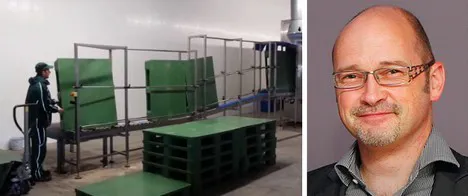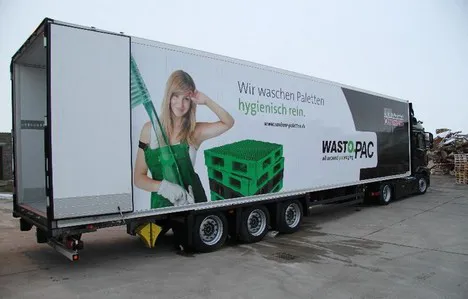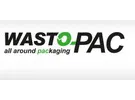For the packaging industry, it has been exciting times since the global pandemic began. There have been significant material shortages and unprecedented cost hikes. The ongoing COVID-19 issue is increasing demand for cheaper plastic crates and pallets. At the same time, pallets are being cleaned and repaired more frequently. That is to avoid buying new materials where possible. That is according to Walter Ahn, Wasto-Pac's managing director.
This German company focuses primarily on cleaning and repairing plastic crates and pallets. They also purchase and trade these new. "These branches complement each other. Some customers have been having their pallets and crates cleaned and repaired with us for years. They end up using our trade branch and vice versa. This synergy sets us apart within this competitive market," said Ahn.

Walter Ahn has been running Wasto-Pac for ten years. Photo credit: Wasto-Pac GmbH
Avoiding new purchases
The food and retail sectors are some of this growing business' largest sales markets, adds Ahn. He and his team are getting more and more clients from particularly these branches. "Recycled materials have become more expensive. And new materials' costs are skyrocketing. That's causing several obvious trends."
"Plastic materials are being cleaned and repaired more frequently. That's to extend their service life. And to avoid or postpone the purchase of new crates and pallets. EPAL wooden pallets users, too, are increasingly switching to cheaper plastic versions. At the same time, users in the more expensive plastic segment are also switching to cheaper alternatives."
To serve their customers even better, Wasto-Pac recently updated its website. They developed a search tool under the web address, paletten.online. It provides targeted price indications and advice. They should also be launching a new webshop at the end of this year. "Paletten.online is intended to ensure that we can provide part of our service online," explains Ahn.
"We give targeted advice. That's based on specific user requirements like load capacity. Then we only have to draw up the final quotation. We're an independent service provider. So, we're not production but customer-oriented. And we aren't tied to one particular brand name. This flexibility and independence are great advantages."
 Wasto-Pac will begin by offering 5-10 standard top sellers in its webshop. Depending on how that goes, they will expand this at a later stage.
Wasto-Pac will begin by offering 5-10 standard top sellers in its webshop. Depending on how that goes, they will expand this at a later stage.
Acute shortages
Ahn expects the plastic materials' market share to only rise. That is given the current COVID-19 developments. "Demand from the food sector will increase. And shortages are becoming more acute. Solid service providers are, therefore, greatly needed, especially now," he concludes.
For more information: Walter Ahn
Walter Ahn
WASTO-PAC GmbH
4a Wildweg
50374, Erftstadt, Germany
Tel: +49 223 546 54 930
Email: [email protected]
Website: www.wastopac.com
